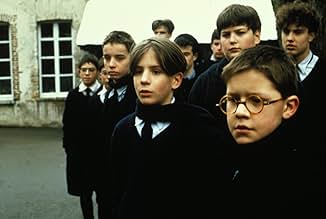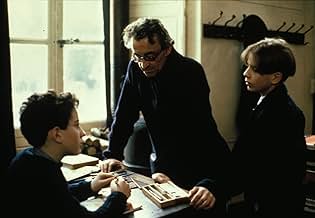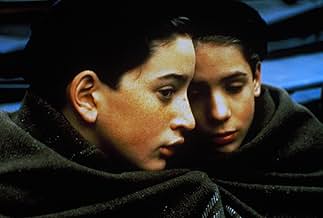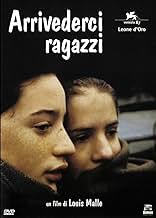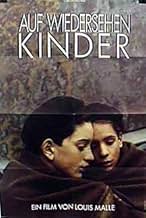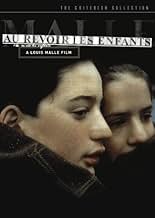IMDb रेटिंग
8.0/10
38 हज़ार
आपकी रेटिंग
पुजारियों द्वारा संचालित एक फ्रांसीसी बोर्डिंग स्कूल द्वितीय विश्व युद्ध से एक नया छात्र आने तक एक स्वर्ग प्रतीत होता है।पुजारियों द्वारा संचालित एक फ्रांसीसी बोर्डिंग स्कूल द्वितीय विश्व युद्ध से एक नया छात्र आने तक एक स्वर्ग प्रतीत होता है।पुजारियों द्वारा संचालित एक फ्रांसीसी बोर्डिंग स्कूल द्वितीय विश्व युद्ध से एक नया छात्र आने तक एक स्वर्ग प्रतीत होता है।
- 2 ऑस्कर के लिए नामांकित
- 28 जीत और कुल 12 नामांकन
Stanislas Carré de Malberg
- François Quentin
- (as Stanislas Carré De Malberg)
Luc Etienne
- Moreau
- (as Luc Étienne)
फ़ीचर्ड समीक्षाएं
10Sloke
The movie was a project close to Louis Malle's heart (he was in tears when the film premiered at a film festival in 1987) and it shows in the multi-layered treatment he gives the central setting, this fascinating boarding school with its broad cast of characters. Because there are so many different strands and affecting moments tangential to the central plot, one is not entirely prepared for the finale even if you are expecting it. French film is characteristically digressive, often to a fault, but here it works to splendid advantage. It also lends itself to repeat viewings.
I don't think you need to have lived in occupied Europe to appreciate this wonderful film; it speaks to all of us who have lived through childhood's quickly-passing parade and know its lifelong regrets. That last image of the stone wall is emblazoned in many consciousnesses, as it is in mine.
There are many interesting choices Malle makes in this film. For example, while the central subject is the Holocaust, nearly all the Germans we actually see in the film are fairly decent if nonetheless menacing types. The real villains here are almost entirely French collaborators, which was done I think to call attention to collaboration during a period when the French were dealing with the Klaus Barbie trial. [Barbie was a Gestapo officer who was aided in his work rooting out Resistance leaders by many French collaborators.] But casting French people as the heavies also suggests the central evil of prejudice and oppression is not something exclusive to one nationality, and it broadens the scope of the movie.
The tender treatment Malle affords the Catholic hierarchy in the movie is unusual, too, when you see other more anti-clerical Malle efforts like "Murmur of the Heart." There is an unexpected sense of spirituality throughout this film, somewhat muted but there all the same.
This may well stand as the cinematic masterpiece of a man who, at his best (see also "Atlantic City" and "My Dinner With Andre") was to motion pictures what his countrymen Zola and Hugo were to novels: An artist who filled his canvas with the verve and breadth of human life.
I don't think you need to have lived in occupied Europe to appreciate this wonderful film; it speaks to all of us who have lived through childhood's quickly-passing parade and know its lifelong regrets. That last image of the stone wall is emblazoned in many consciousnesses, as it is in mine.
There are many interesting choices Malle makes in this film. For example, while the central subject is the Holocaust, nearly all the Germans we actually see in the film are fairly decent if nonetheless menacing types. The real villains here are almost entirely French collaborators, which was done I think to call attention to collaboration during a period when the French were dealing with the Klaus Barbie trial. [Barbie was a Gestapo officer who was aided in his work rooting out Resistance leaders by many French collaborators.] But casting French people as the heavies also suggests the central evil of prejudice and oppression is not something exclusive to one nationality, and it broadens the scope of the movie.
The tender treatment Malle affords the Catholic hierarchy in the movie is unusual, too, when you see other more anti-clerical Malle efforts like "Murmur of the Heart." There is an unexpected sense of spirituality throughout this film, somewhat muted but there all the same.
This may well stand as the cinematic masterpiece of a man who, at his best (see also "Atlantic City" and "My Dinner With Andre") was to motion pictures what his countrymen Zola and Hugo were to novels: An artist who filled his canvas with the verve and breadth of human life.
Au Revoir Les Enfants (1987)
A wrenching, sensitive, all-too-true drama set in a gorgeous French wooded outpost during World War II. The main actors are boys, and they play their parts with unusual conviction, unexaggerated but with intensity. And the anti-Semitism that arises, though inevitable in Nazi territory, comes subtly and really stings. The movie isn't complete without this horror, but the horror is made complete by the really vivid recreation of this kind of private boys school--a period movie at its best.
Director Louis Malle has not only a message, but a sensitive feel for the medium--for making fluid the flow and background of the plots of his films. It's also a fairly complex mix of types, and you can somehow keep them all straight as it goes--as straight as you are meant to as the facts unfold. In the end, it confirms a familiar story of Nazi terror, but one that can't be told too often.
A wrenching, sensitive, all-too-true drama set in a gorgeous French wooded outpost during World War II. The main actors are boys, and they play their parts with unusual conviction, unexaggerated but with intensity. And the anti-Semitism that arises, though inevitable in Nazi territory, comes subtly and really stings. The movie isn't complete without this horror, but the horror is made complete by the really vivid recreation of this kind of private boys school--a period movie at its best.
Director Louis Malle has not only a message, but a sensitive feel for the medium--for making fluid the flow and background of the plots of his films. It's also a fairly complex mix of types, and you can somehow keep them all straight as it goes--as straight as you are meant to as the facts unfold. In the end, it confirms a familiar story of Nazi terror, but one that can't be told too often.
In 1944, the upper class boy Julien Quentin (Gaspard Manesse) and his older brother François travel to the Catholic boarding school in the countryside after vacations. Julien is a leader and good student and when the new student Jean Bonnet (Raphael Fejtö) arrives in the school, they have friction in their relationship.
However, Julien learns to respect Jean and discovers that he is Jewish and the priests are hiding him from the Nazis. They become best friends and Julien keeps the secret of the origins of Jean. When the priest Jean (Philippe Morier- Genoud) discovers that the servant Joseph (François Négret) is stealing supplies from the school to sell in the black market, he fires the youth. Sooner the Gestapo arrives at school to investigate the students and the priests that run and work in the boarding school.
"Au Revoir les Enfants" is an awarded film written and directed by Louis Malle apparently based on true events during World War II in the boarding school where he studied. The touching story of friendship and betrayal is beautiful and sad, and the boys have great performances. Louis Malle highlights the despicable behavior of collaborators and traitor and the most impressive, the German soldiers are tough but respectful with the French civilians. My vote is eight.
Title (Brazil): "Adeus, Meninos" ("Goodbye, Boys")
However, Julien learns to respect Jean and discovers that he is Jewish and the priests are hiding him from the Nazis. They become best friends and Julien keeps the secret of the origins of Jean. When the priest Jean (Philippe Morier- Genoud) discovers that the servant Joseph (François Négret) is stealing supplies from the school to sell in the black market, he fires the youth. Sooner the Gestapo arrives at school to investigate the students and the priests that run and work in the boarding school.
"Au Revoir les Enfants" is an awarded film written and directed by Louis Malle apparently based on true events during World War II in the boarding school where he studied. The touching story of friendship and betrayal is beautiful and sad, and the boys have great performances. Louis Malle highlights the despicable behavior of collaborators and traitor and the most impressive, the German soldiers are tough but respectful with the French civilians. My vote is eight.
Title (Brazil): "Adeus, Meninos" ("Goodbye, Boys")
This movies is one of those movies that you can love, but hate. It makes you hate what happens in the movie. You get so attached to the characters, and when things happen to them, you hate it. But the movie is powerful, wonderfully written and directed by Louis Malle and defiantly should be seen anytime one is studying WWII or the Holocost, or if you have free time, and are looking for a good heart-wrencher. I watched it in French, with subtitles, and that makes it all the better.
An elegantly crafted tale of friendship, compassion & boyhood, Au Revoir Les Enfants is a heartbreaking, poignant & tragic cinema that's actually based on the events which took place during the childhood of this film's director and is an endearing portrait of life at school, student rivalry & beauty of friendship.
Set in France during the final years of the Second World War, the events of Au Revoir Les Enfants takes place in a Catholic boarding school and is narrated through the eyes of Julien Quentin; one of the students at the school. The plot covers his relationship with a newly arrived enigmatic student with whom he's at odds at first but the two learn to get along & share a big secret.
Directed by Louis Malle, the film is nicely crafted with many details beautifully captured by its calmly moving camera. The screenplay tries to get an authentic vibe of education in Catholic schools, the conversations between its characters carry the childlike innocence & the performances by its cast, especially the child actors, becomes more captivating as the story progresses.
On an overall scale, Au Revoir Les Enfants (also known as Goodbye Children) isn't in anyway a hard-hitting or emotionally scarring cinema but the gentle manner in which it depicts its premise really makes you care for its characters, makes you wish they get away, makes you wish for a miracle & although its subject matter has been dealt in a better manner, the film is worthy of a watch for its two main characters alone.
Set in France during the final years of the Second World War, the events of Au Revoir Les Enfants takes place in a Catholic boarding school and is narrated through the eyes of Julien Quentin; one of the students at the school. The plot covers his relationship with a newly arrived enigmatic student with whom he's at odds at first but the two learn to get along & share a big secret.
Directed by Louis Malle, the film is nicely crafted with many details beautifully captured by its calmly moving camera. The screenplay tries to get an authentic vibe of education in Catholic schools, the conversations between its characters carry the childlike innocence & the performances by its cast, especially the child actors, becomes more captivating as the story progresses.
On an overall scale, Au Revoir Les Enfants (also known as Goodbye Children) isn't in anyway a hard-hitting or emotionally scarring cinema but the gentle manner in which it depicts its premise really makes you care for its characters, makes you wish they get away, makes you wish for a miracle & although its subject matter has been dealt in a better manner, the film is worthy of a watch for its two main characters alone.
क्या आपको पता है
- ट्रिवियाBased on an incident from Louis Malle's own youth. Julien is modeled after Malle.
- गूफ़When hiking, Julien asks what day it is and is told that it's Thursday, January 17th, 1944. That date was actually a Monday.
- क्रेज़ी क्रेडिटPour Cuotemoc, Justine et Chloé. (opening credits)
टॉप पसंद
रेटिंग देने के लिए साइन-इन करें और वैयक्तिकृत सुझावों के लिए वॉचलिस्ट करें
- How long is Au Revoir les Enfants?Alexa द्वारा संचालित
विवरण
- रिलीज़ की तारीख़
- कंट्री ऑफ़ ओरिजिन
- आधिकारिक साइट
- भाषाएं
- इस रूप में भी जाना जाता है
- Goodbye, Children
- फ़िल्माने की जगहें
- उत्पादन कंपनियां
- IMDbPro पर और कंपनी क्रेडिट देखें
बॉक्स ऑफ़िस
- US और कनाडा में सकल
- $45,42,825
- दुनिया भर में सकल
- $45,75,613
- चलने की अवधि1 घंटा 44 मिनट
- रंग
- ध्वनि मिश्रण
- पक्ष अनुपात
- 1.66 : 1
इस पेज में योगदान दें
किसी बदलाव का सुझाव दें या अनुपलब्ध कॉन्टेंट जोड़ें


![Bande-annonce [VOST] देखें](https://m.media-amazon.com/images/M/MV5BZDlkMTI5OTgtNmU4My00MzRjLWFkNzMtYmMyMDlhNjQ2OTFmXkEyXkFqcGdeQXRyYW5zY29kZS13b3JrZmxvdw@@._V1_QL75_UX500_CR0)
